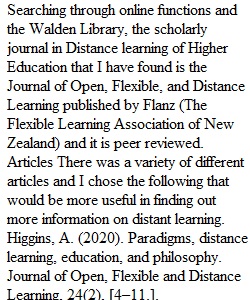


Q Scholarly journals, which are written and reviewed by professionals and academics in the field, can provide critical information to inform our daily practice. There are hundreds of scholarly journals in higher education, covering topics from admissions to teaching zoology. Having such a wealth of information at our disposal is both fortunate and daunting. How can the busy higher education leader decide where to look for information? With this activity, you will become more familiar with the range of journals that are available, determine which journals can be found in the Walden Library, and summarize some basic information about one journal of your choice. Once you have completed your assignment, you will make it available to the entire class by posting it in the DocSharing area, giving everyone useful information about a broad collection of journals that can be used in future assignments. To prepare for this assignment: 1. Select a sector of higher education that interests you. The chapter by Philip Altbach (2001) on the "American Academic Model" and the "Overview of U.S. Higher Education" presentation introduced the basic organization of higher education in the U.S. and the various sectors that have developed over time. Examples include: • Community colleges • Research universities • Liberal arts education • Distance learning • Career and technical education • For-profit colleges and universities 2. Next, search the Web for journals on this topic. For example, if your focus was community colleges, one journal you would probably find in your search is Community College Review. There are multiple journals focusing on each of the higher education sectors listed above, as well as many others. 3. Now, for each journal you find, determine if it is a "scholarly" journal by looking for the following characteristics: • Is it peer-reviewed? That is, does it only publish articles that have been reviewed favorably by one or more individuals with expertise in the field? • Does it have an editorial board? Almost all scholarly journals have an editorial board, composed of individuals with good scholarly records in the field, who oversee the journal's content and publication process. • Who publishes it? If the journal is published by, or in cooperation with, a university, a professional association, or some other academic organization, it is more likely to be a scholarly, high-quality publication. You can find this information on the journal's Web site, usually under " About the Journal," "Aims and Objectives," "Editorial Process," or similar headings. For example, the home page for Community College Review has an "About This Journal" section that states that it is peer-reviewed, it does have an editorial board (and provides a list of members in another section), and is published jointly by Sage Publications and the Department of Adult and Higher Education at North Carolina State University. This meets the criteria for a scholarly journal. If in doubt about any of the information you find on a particular journal, be sure to ask your Instructor. 4. Finally, determine if the journal is available in the Walden Library. Keep searching for scholarly journals until you find one that is available in full-text format in the library. For help finding journals available in the Walden Library, use the Assignment Guide for the Week 2 Application located on the Course Readings page. The example journal, the Community College Review, is available in several research databases, with the most recent issues being available in ProQuest. The assignment: Now that you know you have access to all of the journal's issues and articles, compile the following information: 1. Title of the journal 2. Publisher 3. A brief summary of the journal's purpose, its status as a peer-reviewed journal with an editorial board, and the kinds of information it appears to provide 4. A listing of five or six recent (within the last three years) article titles that interest you, including their authors 5. How the journal might be useful to higher education professionals Formatting your assignment: Follow APA style to format your paper. Include a cover page, an introduction, and a conclusion. It may seem slightly awkward to include an introduction and conclusion for a paper of this type, but it will give you good practice in writing and formatting papers in APA style.You will not need a reference page for this assignment; we'll add reference pages in future assignments. Assignment length: 1 – 2 pages Note: You will submit this assignment to two separate locations. 1. The submission link 2. DocSharing As your colleagues upload their files, you will be able to go to DocSharing and download them, providing you information about all of the journals summarized by the class. Submission and Grading Information To submit your completed Assignment for review and grading, do the following: • Please save your Assignment using the naming convention “WK2Assgn+last name+first initial.(extension)” as the name. • Click the Week 2 Assignment Rubric to review the Grading Criteria for the Assignment. • Click the Week 2 Assignment link. You will also be able to “View Rubric” for grading criteria from this area. • Next, from the Attach File area, click on the Browse My Computer button. Find the document you saved as “WK2Assgn+last name+first initial.(extension)” and click Open. • If applicable: From the Plagiarism Tools area, click the checkbox for I agree to submit my paper(s) to the Global Reference Database. • Click on the Submit button to complete your submission. Journal Search
View Related Questions